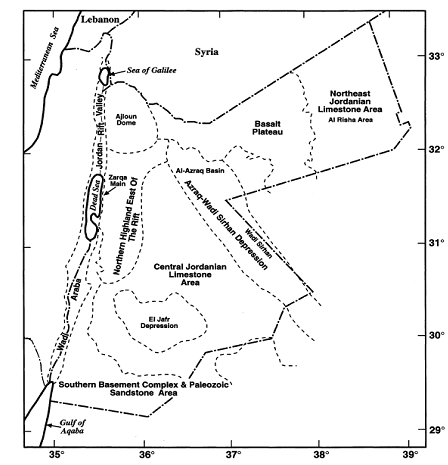Geological and physiographic subdivisions
Deposits of Quaternary age in Jordan reflect continuous uplifting and retreating of the marine environment, extensive mafic volcanic and shallow intrusive activity. The volcanics occur as localized flows and plugs, and as plateau flood basalts. These are chemically primitive and appear to reflect rapid propagation of fractures into the mantle, followed by rapid extrusion (Barberi et al., 1979). Based on geological, paleogeographic and stratigraphic evidence, the territory of Jordan can be sub-divided into seven major geological physiographic provinces (Fig. 2).
Figure 2. Geologic–physiographic provinces of Jordan.

The map shows the Wadi Araba-Dead Sea–Jordan Rift Valley, Northern Highlands East of the Rift, Southern Basement Complex and Paleozoic Sandstone Area, Azraq–Wadi Sirhan Depression, Basalt Plateau, the Northeast Jordan Limestone Area and the Central Jordan Limestone Area (after Bender, 1975)
Wadi Araba-Dead Sea–Jordan Rift Valley, Northern Highlands East of the Rift, Southern Basement Complex and Paleozoic Sandstone Area, Azraq–Wadi Sirhan Depression, Basalt Plateau, the Northeast Jordan Limestone Area and the Central Jordan Limestone Area (Bender, 1975).